ספרים ומאמרים
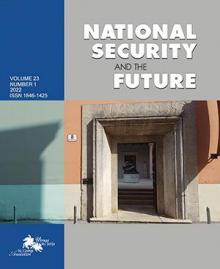
The War in Ukraine Through the Prism of Presidential Decision-Making Processes, vis-à-vis Media and Cyber Warfare
National Security and the Future, 23 (2), 2022.המאמר דן במלחמה באוקראינה בכמה ממדים: הרקע המשותף לרוסיה ולאוקראינה, אישיות מקבל ההחלטות הנשיא פוטין שחזה בקריסת ברה"מ עת היה בנפילת חומת ברלין בגרמניה המזרחית ומבקש להחזיר את רוסיה לימי גדולתה, על רקע בריתות נאט"ו אותן הוא מבין כאיום על רוסיה. מנגד ניצב הנשיא זלנסקי, שחקן שמלא את "תפקיד חייו" כנשיא טלויזיוני ונבחר להיות נשיא בפועל. אחרי תחילת כהונה עם בעיות כקורונה ועצמאות יתר של ראשי-הערים, גילה מנהיגות במלחמה. בנוסף, ייבחן סיקור המלחמה בערוצי התקשורת של רוסיה ואוקראינה וכן התקפות סייבר שלמעשה החלו שבוע לפני הלחימה ב15 בפברואר. המאמר מציג מתווה לסיום המלחמה בדמות דיפלומטיה שתכיר באי יכולת הצטרפות אוקראינה לנאט"ו מחד גיסא, תוך כדי עמדה מערבית חזקה לשמירת על שלמות המדינה. חשיבות המהלך הישראלי של ראש-הממשלה בנט, נדונה כדוגמא ולשם כך מובא דיון בערוץ אוקראיני בולט שהזכיר זאת.
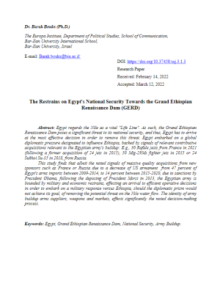
The Restrains on Egypt's National Security Towards the Grand Ethiopian Renaissance Dam (GERD)
Security Science Journal, 3 (1), 2022, 39-50המאמר דן בדוקטרינת הבטחון המצרית בעקבות הקמת סכר הרנסנס באתיופיה: דיפלומטיה ובניין כח צבאי לקראת תגובה אפשרית. במאמר נדון חרם נשק שהטיל ממשל אובאמה האמריקני על ממשל הנשיא א-סיסי וכתוצאה מכך מצרים החלה להתחמש בנשק צרפתי כמטוסי רפאל ונשק רוסי כמטוסי סוחוי. המעורבות הרוסית הגוברת במצרים משפיעה על עמדת מצרים כלפי המשבר באוקראינה.
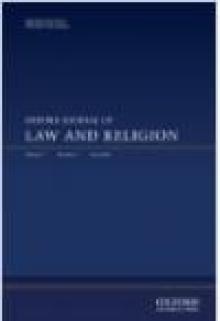
Governing the Sacred: A Critical Typology of Models of Political Toleration in Contested Sacred Sites
Oxford Journal of Law and ReligionContested sacred sites pose an overlooked challenge for theorists of political toleration. Holy sites are often at the center of contestation between different groups regarding ownership, access, usage rights, permissible religious conduct. Two questions are posed, first, how to conceptualize ‘contested sacred sites’? Second, what are the historical-political arrangements used to govern such contested sacred sites, that can be adopted by democratic countries? This article, first, suggests a conceptualization of contested sacred sites as ‘thick sites’ a la Geertz. Second, describes and analyzes five models of governing contested sacred sites: ‘non-interference’, ‘separation and division’, ‘preference’, ‘status-quo’, and ‘closure’. Each model is grounded in historical-political examples and relies on different normative considerations. The goal is to present a new typology of governing methods that can be adopted by democratic governments in their attempt to secure public order and mutual toleration among opposed groups in contested sacred sites.
שבע שנים למהפכת 2011: יחסי ישראל מצרים". בתוך שאול שי (עורך), מצרים על פרשת דרכים: שבע שנים לאחר מהפכת ה"אביב הערבי".
המכון למדיניות ואסטרטגיההמאמר עוסק בבחינת יחסי ישראל-מצרים במלאת שבע שנים למהפכת 2011 וסוקר את האתגרים שעמדו לאורך התקופה מאז חתימת הסכם השלום בין המדינות: הנשיא מובארכ, נפילתו ועליית הצבא, האחים המוסלמים והתקופה הנוכחית, בה מכהן הנשיא אל-סיסי. יחסים אלה מאופיינים באופי מיוחד שהושתת בימי הנשיא מובארכ, לפיו לא מתקיימת מערכת בילטרלית בין המדינות, אלא נותרו שלושה ממדים בלבד: הממד הבטחוני, הסכם הQIZ (אזור התעשיה הפטור ממכס) וקיום צינור הגז ממצרים לישראל ולירדן.
המהפכה שהתרחשה בשנת 2011 והביאה לעליית המועצה הצבאית העליונה, פגעה בממד הדיפלומטי והביאה לפינוי השגרירות הישראלית (אחר השתלטות על הבנין שבו שכנה והצורך לפנות את צוות השגרירות שבראשו עמד השגריר יצחק לבנון, באישון לילה ממצרים). למרות המבחן החמור הנ"ל והפסקת הפגישות בין קברניטי המדינות, המשיכו להתקיים היחסים בין הצבאות. עלייתו של הנשיא מורסי, שעמד בראש תנועת האחים המוסלמים, הביאה לחשש באשר לעתיד היחסים בין המדינות, אך שלטונו של עבד אל-פתאח אל-סיסי, שעלה לשלטון אחר מורסי ומשמש כנשיא הנוכחי, יישם גישה פרגמטית שנובעת מן הצורך הבטחוני. צורך זה בא לידי ביטוי בדמות התקפות טרור, שהגיעו לשיאן בשנת 2015 (הנתונים מוצגים בגרף התקפות טרור בין השנים 2010-2016). עם זאת, עדיין ישנו חוסר איזון בין פעילות השגרירות המצרית בת"א, לבין שגרירות ישראל בקהיר (שחזרה לפעול בהרכב מצומצם מאשר בעבר).

Fanaticism Through the Looking Glass of Simulations
Journal of Political Science EducationThis research offers innovative ways to study fanaticism in higher education. It builds on simulations of regional crises to test four expectations and discusses their implications. The first, on the benefits of experimental learning, is supported: participants identify with their actors and show little empathy to rivals, indicating they learn the script and play seriously. So simulations provide an effective method to study fanaticism and should be used more frequently. Findings on crisis negotiations show that participants disregard fanaticism in the scenario, consider themselves as moderates, and label rivals as fanatic. Rather than admitting deadlock or defeat, they regard negotiation outcomes as compromise. These results refute three expectations: perceptions of fanaticism are not knowledge-based or bias/prejudice free; success and outcome assessment are not based on relative goal attainment; and common heuristics rather than individual inclinations shape perceptions and ways of coping with fanaticism. Together, negotiations, feedback, and in-depth debriefing on appeasement, other policy alternatives, and the role heuristics create a comprehensive simulation experience. Further applications of experimental learning in political science could enhance the role of education as a crucial means to confront fanaticism and minimize its dangers.
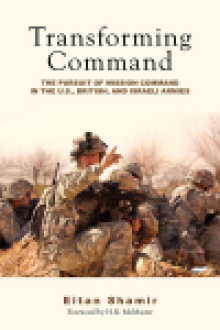
Transforming Command The Pursuit of Mission Command in the U.S., British, and Israeli Armies
Stanford University PressOn today's complex, fragmented, fast-moving battlefield, where combatants adapt constantly to exploit one-another's weaknesses, there is a demonstrable requirement for military commanders to devolve a high level of autonomy of decision-making and action to leaders on the ground. An effective model for doing this has existed for some time in the form of mission command and has been utilized by the U.S., Israeli, and British Armies—but with mixed success.
This book examines in depth the experiences of the armed forces of each of these countries in implementing mission command, and reveals the key factors that have determined the success or failure of the implementation—factors such as the Revolution in Military Affairs (RMA), the spread of low-intensity conflicts and operations other than war, and differences in how military cultures interpret, articulate, and exercise the command function. It has significant implications for both the development of military doctrine and the training and education of tomorrow's military leaders.

An Introduction to Religion and Politics: Theories and Practice, Second Edition
RoutledgeThis fully revised edition offers a comprehensive overview of the many theories of religion and politics and provides students with an accessible, in-depth guide to the subject’s most significant debates, issues, and methodologies.
It begins by asking the basic questions of how social scientists see religion and why religion remains relevant to politics in the modern era. Fox examines the influence of religious identity, beliefs, institutions and legitimacy on politics, and surveys important approaches and issues found in the literature on religion and politics. Four new chapters on religious policy around the world, political secularism, and religious freedom and human rights have been added to fully revised content covering religious identity, rational choice approaches to religious politics worldviews, beliefs, doctrines, ideologies, institutions and political mobilization, fundamentalism, secularization, and religion and conflict.
This work will be essential reading for all students of religion and politics, comparative politics, international relations, and security studies.

Uneven Ground: Nationalist Frames and the Variable Salience of Homeland
Security StudiesWhen are domestic publics most sympathetic to nationalist territorial ambitions? Conflict scholars commonly assume support should be greatest when territory is framed as being of intangible value to national identity over tangible importance to national security and economic prosperity. This should be especially true regarding lost homelands, territories wherein a state has previously exercised sovereignty and to which it has enduring ethnic ties. This article presents experimental evidence that directly challenges these assumptions, demonstrating the variability of Serbian popular attachments to three lost territories: Kosovo, Bosnia, and Montenegro. It finds that intangible framings do not necessarily engender stronger assertions that such territories belong to the homeland than tangible framings do. Nor do they necessarily motivate greater support for nationalist territorial agendas. These findings cast doubt on conventional wisdom regarding domestic publics' contributions to territorial conflict and offer refined insights regarding in which instances intangible claims are most conflict-prone.
לצפייה במאמר המלא ניתן ללחוץ כאן
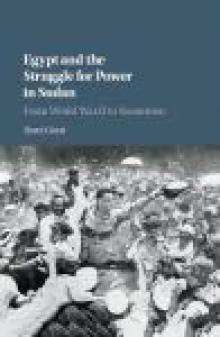
Egypt and the Struggle for Power in Sudan
Cambridge University PressFor decades, the doctrine of the Unity of the Nile Valley united Egyptians of a variety of political and nationalist backgrounds. Many Egyptians regarded Sudan as an integral part of their homeland, and therefore battled to rid the entire Nile Valley of British imperialism and unite its inhabitants under the Egyptian crown. Here, Rami Ginat provides a vital and important revised account of the history of Egypt’s colonialist struggle and their efforts to prove categorically that the Nile Valley constituted a single territorial unit. These were clustered around several dominant theoretical layers: history, geography, economy, culture, and ethnography. This book, for both Middle Eastern and African historians, uses a mixture of Arabic and English sources to critically examine the central stages in the historical development of Egypt’s doctrine, concentrating on the defining decade (1943–1953) that first witnessed both the pinnacle of the doctrine’s struggle and the subsequent shattering of a consensual nationalist dream.

Women of the Wall: Navigating Religion in Sacred Sites
Oxford University PressIn October of 2014, 12-year-old Sasha Lutt read from a tiny Torah scroll as a part of her bat mitzvah in the Women's section of the plaza at the Western Wall, Judaism's holiest prayer site. Surrounded by members of the multi-denominational organization, the Women of the Wall, one of whom had smuggled the scroll into the plaza, Sasha became the first woman to read from the Torah at the site. For more than twenty five years, the Women of the Wall have been waging a campaign to gain the Israeli government's permission to pray at the Western Wall. Despite widespread media coverage, this is the first comprehensive study of their struggle.
Yuval Jobani and Nahshon Perez offer an in-depth analysis of the Women of the Wall's attempts to modify Jewish-orthodox mainstream religious practice from within and invest it with a new, egalitarian content. They present a comprehensive survey of the numerous legal rulings about the case and consider the broader political and social significance of the Women of the Wall's activism. In this way, Jobani and Perez are able to address broader issues of religion-state relations: How should governments manage religious plurality within their borders? How should governments respond to the requests of minorities that conflict with ostensibly mainstream interpretations of a given tradition? How should governments manage disputed sacred sites and spaces located in the public sphere? Women of the Wall: Navigating Religion in Sacred Sites offers a critical new look at theories of religion-state relations and a fresh examination of religious conflicts over sacred sites and public spaces.



